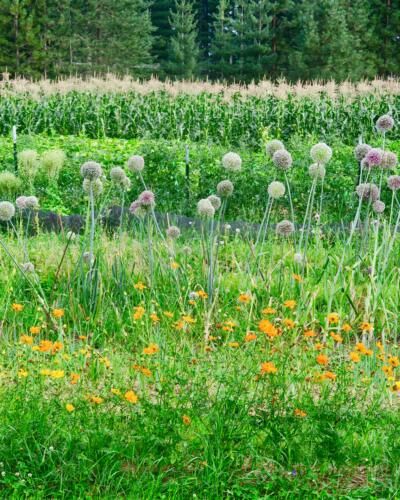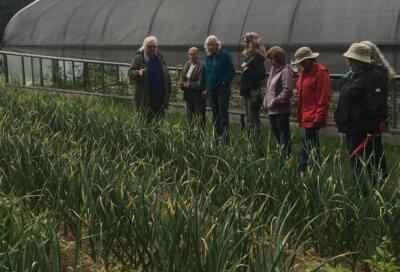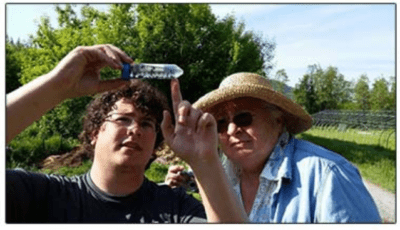The Story of Diane Inexperienced and Greentree Naturals
Written by Elizabeth Tobey

Diane Inexperienced is a farmer, researcher, and educator, who has been tending the land at Greentree Naturals Farm in northern Idaho for over 30 years.
Nestled between the Cupboard and Selkirk Mountain ranges exterior of Northern Idaho, simply 60 miles south of the Canadian border, lies Greentree Naturals Farm. Diane Inexperienced and her husband, Thom Sadoski, have been tending this licensed natural farm for over three a long time. At its peak, this small farm had 2.5 acres in manufacturing. In recent times, as Diane and Thom have entered their 70s, they’ve downsized and are actually actively farming one acre. They produce 130 kinds of licensed natural greens, herbs, connoisseur garlic, flowers, hops, and seeds—lots of that are open-pollinated and saved yearly. Their mission has all the time been clear: to construct group by means of training, to mannequin exemplary land stewardship, and to offer contemporary, nutritious natural produce to their area people.
Over time, Greentree Naturals has hosted quite a few analysis tasks in collaboration with native universities in Washington, Idaho, and Montana, and the Natural Seed Alliance. They’ve additionally acquired funding from OFRF and a number of other of the foremost USDA analysis grant applications, together with NIFA’s Natural Transition Program (ORG) and the Sustainable Agriculture Analysis and Training (SARE)—each applications OFRF works to bolster and shield by means of our advocacy work.
We spoke with Diane within the spring of 2024 about her expertise as a farmer and the significance of analysis, collaboration, and group training.
Why Natural?
For Greentree Naturals, natural farming is greater than a technique—it’s a dedication to conservation and land stewardship. Reflecting on the broader impacts of local weather change and environmental degradation, she emphasizes that everybody can contribute, no matter their scale of operation.
“Once I take a look at all of the issues taking place with local weather change and the desecration of the earth, it’s overwhelming,” Diane shares. “Rising organically is about making a dedication to working towards conservation and land stewardship, and it’s one thing that everybody can decide to, whether or not they have a number of develop packing containers or a one-acre market backyard, or a whole lot of acres of meals manufacturing.”
This dedication is mirrored in each facet of Greentree Naturals, from their numerous crop choices to their sustainable farming practices and their steady participation in natural agriculture analysis and training actions on their farm.
Challenges and Adaptation

Natural crops rising within the fields at Greentree Naturals.
Farming in Northern Idaho presents distinctive challenges, notably with the more and more unpredictable climate. Over time, Diane and Thom have stored detailed notes and noticed vital adjustments in climate patterns, together with extra excessive circumstances, akin to 90-degree days in Could dropping to freezing temperatures in a single day. These circumstances necessitate season extension strategies and fixed adaptation. “Every thing I believed was regular has modified,” Diane notes. Planning for these extremes and embracing flexibility is vital to success. “I inform my gardening college students that so long as you propose for the most popular, coldest, wettest, driest rising season in recorded historical past, you’ll be able to develop in North Idaho. However I suppose that’s in all probability the identical for rising in all places anymore.”
Diane underscores the significance of on-farm analysis in observing these adjustments and creating adaptive methods. “On-farm analysis [is] a manner to assist individuals give attention to documenting these adjustments, and dealing collectively by means of partnerships to seek out options to adapt to these challenges,” she says.
Because the rising seasons turn into hotter, Diane and Thom have observed new pests displaying up. “We’ve had new beneficials too,” Diane notes. “Final yr, we noticed praying mantises displaying up, which we’ve by no means had earlier than.” However the brand new kinds of pests might be alarming and current a problem. The farm now has three kinds of wireworms which weren’t current earlier than. “The grad scholar that was specializing in wireworms was thrilled about it, we’re not a lot,” Diane says with amusing. As these variables come into play, Diane highlights the significance of clear observations and documentation. “As farmers, we’re all the time watching,” she says, including that collaborating in analysis could make a distinction in the way you see issues. “It makes you focus,” she says. “I like that.”
Conservation Practices

Greentree Naturals produces 130 kinds of licensed natural greens, herbs, connoisseur garlic, flowers, hops, and seeds.
At Greentree Naturals, wholesome soil is the cornerstone of their farming philosophy. Diane emphasizes the significance of eager about soil as a residing entity. “The extra we be taught, the extra we all know we’ve got to find out about rising wholesome soil,” she says. The farm employs quite a lot of practices to reinforce soil well being, together with lowered tillage and canopy cropping, using mustard as a predominant cowl crop as a result of it germinates and grows nicely in quite a lot of circumstances. In addition they make the most of worm composting and make their very own compost, supplemented with OMRI-approved rooster manure-based compost when crucial.
Intimately associated to soil well being, water high quality and biodiversity are crucial to their conservation efforts. Greentree Naturals is bordered by wild lands, resulting in frequent encounters with native wildlife akin to black bears, grizzlies, deer, and elk. Diane incorporates these animals into the pest administration workshops she teaches, discussing find out how to coexist collaboratively with nature.
Analysis and Training
Greentree Naturals has been a hub for quite a few analysis tasks and Diane’s ardour for training is obvious in her intensive involvement in on-farm analysis and group training. She contracts with the Oregon State College and the College of Idaho as a marketing consultant, advisor, and farmer-educator. She can be one of many founders of the Cultivating Success Small Farms Training Program and a mentor with the USDA Transition to Natural Partnership Program (TOPP) with Oregon Tilth.
Thom and Diane each have backgrounds amassing area information for the USFS, and have been taught early on the significance of recording correct area data. Their fields are mapped with numbered rows and easy-to-identify places of plots, particular crops, and area purposes. And, as a result of they’re a licensed natural farm, they’re required to take care of clear data of every part they do within the fields.
The farm has been a number web site for quite a lot of analysis tasks, together with:
- Efficacy Analysis of Organic Management Brokers In opposition to Wireworms in Natural Manufacturing
- Soil Well being and Fertility Testing to Optimize Natural Carrot and Beet Manufacturing in Northern Idaho
- Biodiversity and Pure Pest Suppression
- Extension of Native Meals Manufacturing in Idaho Utilizing Excessive Tunnel Expertise
- Combining Entice Cropping with Companion Planting to Maximize Management of the Crucifer Flea Beetle in Natural Blended Vegetable Farms
- On-Farm Selection Seed Trials for Natural Techniques
Detailed details about the analysis tasks is on the market on the farm’s web site.

Internet hosting area days is a crucial a part of group engagement and training at Greentree Naturals farm.
Diane believes strongly within the necessity of those analysis collaborations. “It’s actually necessary with agriculture analysis that it’s duplicated on a farm and doesn’t solely occur in a managed college web site,” she asserts. “The extra we domesticate partnerships between universities and on-farm analysis, the higher.”
Internet hosting area days has additionally turn into a considerable a part of how Greentree Naturals promotes farmer training and networking. They’ve needed to cap attendance for these occasions, which frequently promote out.
“Area days are an exquisite alternative to community with different farmers, group members, and researchers,” Diane says. “We’ve so loved internet hosting these at our farm.” They’ve discovered that the format of a Sunday afternoon occasion that features lunch works nicely for them and their farming group. “Farmers need to be taught from farmers,” Diane states, noting that they’re all the time certain to pair a farmer with an extension educator or researcher in order that the 2 views might be shared side-by-side.
Partaking Farmers in Grant Funded Analysis

Diane believes on-farm analysis is a crucial element of profitable natural analysis and innovation.
Grant-funded analysis has performed a major function within the farm’s capacity to conduct significant analysis. Diane was fast to notice that the cash shouldn’t be the one motive they’ve participated in analysis tasks; they’ve donated a whole lot of hours and manufacturing area to analysis tasks. However as Diane says, it’s way more sustainable for farmers to take part in analysis when their contributions are honored. “It’s a lot simpler to let go of a manufacturing space for analysis should you’re compensated,” she explains. She notes that too usually grantees come to the farmers after a grant is already written. She strongly encourages researchers and extension workers to interact farmers within the grant-writing course of from the start to make sure that satisfactory compensation that respects the farmers is written into the proposal.
Diane encourages different farmers to interact in on-farm analysis and to make the most of current sources and partnerships, noting that “as farmers, we’re always experimenting and testing our concepts.” However, she says, “it’s necessary to remind ourselves we don’t need to reinvent the wheel.” There are many sources accessible from sources like OFRF, SARE, and others. Diane additionally recommends forming partnerships with native extension educators. “Don’t attempt to do this stuff alone,” she advises.

College college students help with an on-farm analysis trial.
“Utilized analysis and partnerships are essential,” Diane continues, emphasizing the broader significance of collaboration and group in agricultural analysis. “As farmers, we are typically fairly remoted, and we are inclined to need to put our heads down and do what we’re doing,” Diane admits. “However I feel ideally the most effective issues we might be doing for ourselves and for the planet is working collectively and constructing partnerships by means of the agricultural group.”
By forming partnerships and fascinating in utilized analysis, farmers can obtain extra vital and impactful outcomes, benefiting each their operations and the broader agricultural group. “It’s going to take all of us working facet by facet,” Diane states.
Wanting Ahead
As Diane and her husband start to downsize their operations, she has concern for the way forward for agriculture, notably the lack of farmland to growth and the challenges new farmers face.
“There must be a brand new mannequin for farmland succession, particularly in natural farming,” she urges. Diane envisions a future the place farmland is preserved for brand new generations of farmers, guaranteeing that the biodiversity and sustainability practices they’ve cultivated at Greentree Naturals proceed to thrive, whereas additionally supporting getting old farmers of their retirement.
Conclusion
Diane Inexperienced’s story is one in all hope, resilience, and unwavering dedication to natural farming and group training. By means of her work at Greentree Naturals, she demonstrates that sustainable farming shouldn’t be solely attainable however important for the well being of our planet and our communities. Her message is evident: by working collectively, farmers, researchers, and educators can create a extra sustainable and equitable agricultural system for future generations.
Ensure you by no means miss a Farmer Story like Diane’s from OFRF by signing up for our publication right here. Have you learnt a farmer whose story must be featured? Fill out this quick type to tell us about them.

